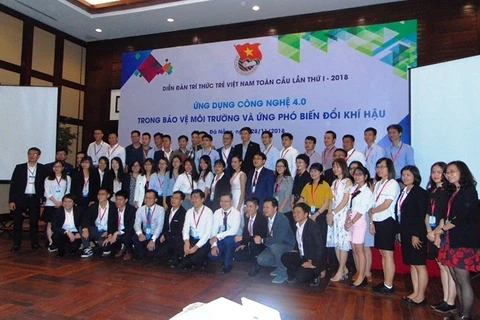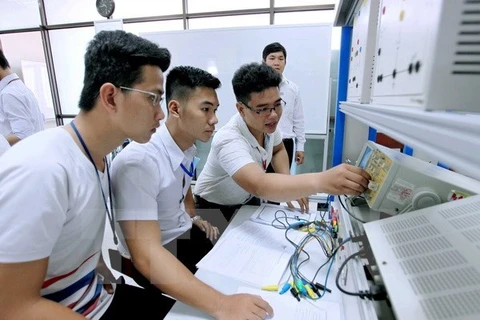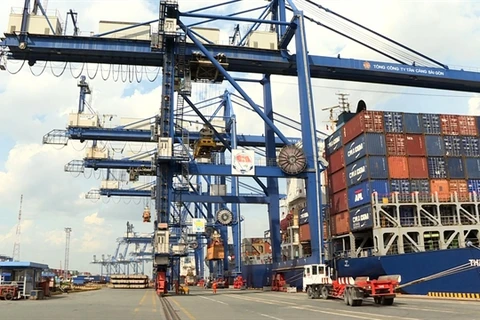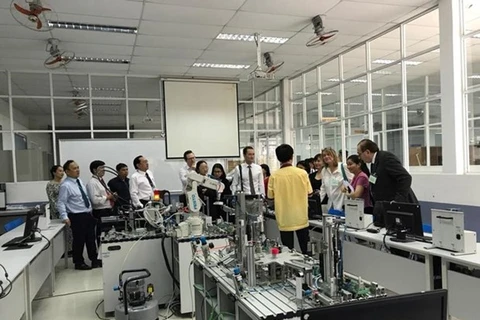Hanoi (VNS/VNA) - Emerging technology and relentless changes in labour markets have forced young people in Southeast Asia to constantly upgrade their skills, a research released this week by the World Economic Forum (WEF) and Singaporean-based internet company Sea has revealed.
The survey of some 56,000 respondents aged from 15 to 36 from six ASEAN countries including Indonesia, Malaysia, the Philippines, Singapore, Thailand and Vietnam shows their awareness of potential disruptions and challenges the Fourth Industrial Revolution might pose to their future employment opportunities.
While only 9 percent of them think their current skills are already outdated, more than 52 percent say they have to persistently up skills.
This mindset is also reflected in labour mobility with half of the respondents expressing their desire to work abroad.
The first reason for ASEAN youngsters to change jobs is to learn new skills while better pay is second.
Up to 81 percent of ASEAN youths think hands-on experience during internships is as important as formal education.
Justin Wood, WEF Head of Asia Pacific, stressed the unpredictability of the job market under the pressure of technology and innovation.
"The only certainty is that job markets face accelerating disruption, where the lifespan of many skills is shortening. It is encouraging that ASEAN youths are aware of these challenges and show a deep commitment to lifelong, ongoing learning,” he said.
Soft skills put first
ASEAN youths tend to pay more attention to improving their soft skills, namely emotional intelligence, resilience and adaptability, rather than science, technology, engineering and maths (STEM) skills.
Creativity and innovation are the most important skills, according to respondents, followed by the ability to speak multiple languages and apply technology.
They showed increasing interest in technology companies with 7 percent joining the technology sector today yet 16 percent aiming to work in the sector in the future.
Explaining the trend, Santitarn Sathirathai, Sea Group Chief Economist, said technology is growing fast and setting high demands for people from different backgrounds.
He emphasised the significance of soft skills in ensuring young people’s resilience to constantly building their capabilities to keep up with a changing market, but also recommended governments keep investing in enhancing STEM skills among young people.
“It is not a race on who have higher technology, it is how you bring that technology, combining with online and offline communications to create a solution centred around customers. Technology you just simply brought from abroad will not work in this region. You have to understand the localisation,” he said.
Agreeing, Wood said the technology sector was more than writing code and developing apps.
“ASEAN has a very young population with 383 million people under 35, accounting for roughly 61 percent. In order to build a bright future for young people, it is critical for governments and businesses to understand their views, their concerns, aspirations, priorities and so on,” said Wood.
ASEAN countries are being put on an entrepreneurial setting with 33 percent of respondents desiring to be entrepreneurs or working for start-up companies in the future.
Meanwhile, traditional SMEs are less favoured with only 8 percent considering working for SMEs.
As Vietnam aims to have at least five start-up unicorns by 2025, Minister of Information and Communications Nguyen Manh Hung said it would be essential to integrate information and communication technology (ICT) into general education.
“Besides, we need to teach people how to adapt to changes of the labour market. It is not only technology training but also soft skills training as the Fourth Industrial Revolution is more likely the mindset revolution,” he said.
Responding to the need for a high-quality workforce to deal with fast-changing technology, WEF launched the ASEAN Digital Skills Vision 2020 programme last November to gather organisations to offer training courses for some 20 million workers at ASEAN SMEs by 2020, as well as internship and scholarship opportunities.
Sixteen organisations have joined the programme, including Vietnam’s largest information technology company FPT and tech unicorn VNG.-VNS/VNA
VNA

























